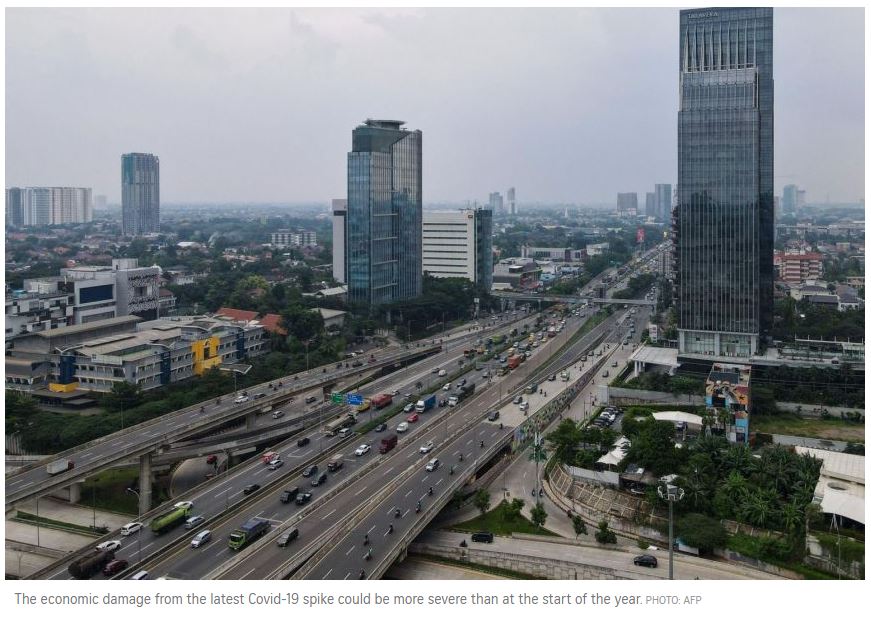Indonesia left with few options as Covid-19 surge hits economy
JAKARTA (BLOOMBERG) – Indonesia is left with few easy options to bolster its economy as a virus resurgence threatens its recovery at a time when it is seeking to rein in debt and the United States Federal Reserve is turning hawkish.
South-east Asia’s largest economy cut rates last year and rolled out stimulus spending as the pandemic plunged the economy into the first contraction in more than 20 years. But just as it signals a return to growth this quarter, a worsening Covid-19 outbreak could halt the rebound in consumer spending and investment.
This time, more central bank easing or aggressive state spending could exacerbate fund outflows from Indonesia as the Fed prepares to consider an end to its own pandemic-era support.
The economic damage from the latest virus spike could be more severe than at the start of the year, as the highly transmissible delta variant, first identified in India, drives local infections, according to Moody’s Analytics economists Katrina Ell and Sonia Zhu.
“Bank Indonesia is in a quandary and has limited space to bolster domestic demand,” they said.
“Lowering benchmark interest rates risks destabilising the already vulnerable rupiah via aggressive capital outflows,” they added, noting that fiscal policy will likely have to do the heavy lifting going forward.
Fed ripples hit hardest in Asia
Bank Indonesia left its key rate unchanged last week despite below-target inflation as the rupiah suffered its largest drop since February amid hints that the Fed would soon begin discussing reducing its asset purchases.
While gross domestic product (GDP) should expand this quarter – and even show “moderately high” growth – central bank Governor Perry Warjiyo warned that the actual number would depend on how the worsening outbreak impacts June data. Bank Indonesia last Thursday (June 17) affirmed its full-year GDP growth estimate at 4.1 per cent to 5.1 per cent, after last year’s contraction.
The country’s fiscal policy chief Febrio Kacaribu told investors last Thursday that “the surge in Covid-19 infections could compel stricter mobility restrictions”, which could weigh on consumer confidence and economic activity.
Record infections
Indonesia added a record-high 14,536 new infections on Monday, as hospitals reached critical capacity and ran short of staff. The government responded by banning public gatherings in worst-hit areas and limiting operations of non-essential businesses until July 5.
Finance Minister Sri Mulyani Indrawati said in a briefing on Monday that the Cabinet is ready to take “more detailed and firm steps” to deal with the virus outbreak.
She added that demand for Indonesian debt papers seems to be holding up despite the Fed’s latest signals, allowing the government to keep its borrowing costs steady and gradually reduce its dependence on the central bank as a standby buyer during auctions.
“We’ll continue to maintain our fiscal management that is trusted by investors,” Ms Indrawati said.
However, state spending could be hamstrung by a pledge to bring the budget deficit back under 3 per cent of GDP in two years, from a projected 5.7 per cent budget, rather than raise spending, if more stimulus is needed, Deputy Finance Minister Suahasil Nazara said on Thursday.
The pandemic-era spending spree “should be temporary” and tax reform is needed to protect fiscal health, Mr Nazara added.
One bright spot is the country’s ample foreign reserves, which could help it weather any foreign outflows connected to Fed tapering, according to OCBC Bank economist Wellian Wiranto.
“Still, to anchor market confidence further, it might have to signal a more conservative stance on both fiscal and monetary fronts – at a tricky time when its economy may be getting hit once again by a pandemic resurgence and requires more help,” he said.
Source: https://www.straitstimes.com/business/economy/indonesia-left-with-few-options-as-covid-19-surge-hits-economy


 English
English




